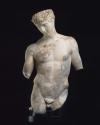Advanced Search
Statue of Mercury (Hermes)
Roman
Imperial Period
A.D. 30–50
Medium/Technique
Marble (probably from the Greek island of Paros)
Dimensions
Overall: 72cm (28 3/8in.)
Credit Line
Catharine Page Perkins Fund
Accession Number95.67
CollectionsAncient Greece and Rome
ClassificationsSculpture
Catalogue Raisonné
Sculpture in Stone (MFA), no. 145; Sculpture in Stone and Bronze (MFA), p. 111 (additional published references).
DescriptionAn under life-size nude; the wings in his hair, now broken off, indicate he is Mercury (Hermes), the messenger of the gods and conductor of souls to the Underworld. The right arm was held close to the body as indicated in the strut visible on the thigh. The left arm is slightly bent back, indicating that it probably held an object such as a caduceus. This work is a fleshier, Roman interpretation of the style of the Greek sculptor Polykleitos.
It has been suggested that the Hermes/Mercury stood in the facade of the amphitheater of Capua, placed there during a renovation probably dating to the reign of Antoninus Pius.
The top of the head, now missing, was originally pieced. A hard, calcareous deposit partly covers the front of the body; this has been removed from the face, neck, and parts of the chest by means of acid, corroding and discoloring portions of the surface.
Scientific Analysis:
Harvard Lab No. HI357: Isotope ratios - delta13C +4.92 / delta18O -3.37, Attribution - Paros 1.
It has been suggested that the Hermes/Mercury stood in the facade of the amphitheater of Capua, placed there during a renovation probably dating to the reign of Antoninus Pius.
The top of the head, now missing, was originally pieced. A hard, calcareous deposit partly covers the front of the body; this has been removed from the face, neck, and parts of the chest by means of acid, corroding and discoloring portions of the surface.
Scientific Analysis:
Harvard Lab No. HI357: Isotope ratios - delta13C +4.92 / delta18O -3.37, Attribution - Paros 1.
ProvenanceSaid to have been found in the neighborhood of Capua [see note 1]. By 1895, Edward Perry Warren (b. 1860 - d. 1928), Rome and London; 1895, sold by Warren to the MFA for $ 29,857.37 [see note 2]. (Accession Date: January 1, 1895)
NOTES:
[1] L. D. Caskey, Catalogue of Greek and Roman Sculpture (1925), pp. 143-144, cat. no. 70.
[2] This figure is the total price for MFA accession nos. 95.9-95.174.
NOTES:
[1] L. D. Caskey, Catalogue of Greek and Roman Sculpture (1925), pp. 143-144, cat. no. 70.
[2] This figure is the total price for MFA accession nos. 95.9-95.174.





